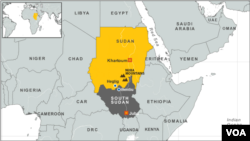The deadline for Sudan and South Sudan to return to the negotiating table in Ethiopia came and went Wednesday without a resumption in talks. One of the major obstacles is oil transit fees.
During negotiations last year Sudan proposed South Sudan pay $32 per barrel, whereas South Sudan offered one dollar, which is much closer to international standards. South Sudan inherited about three-quarters of the Sudanese oil after it split from Khartoum last year, but Sudan has the infrastructure to transport, refine, and export the oil.
Luke Patey, a scholar at the Danish Institute for International Studies, has been researching the oil conflict between the Sudans. He explains that South Sudan based its fees on the example of the Chad-Cameroon pipeline. That pipeline runs approximately 1,000 kilometers and costs Chad about 41 cents per barrel. Patey says that since the two pipelines in Sudan are between 1,500 and 1,600 kilometers long, South Sudan deemed one dollar a barrel reasonable for each pipeline.
Patey says Sudan’s much higher price proposal came out of its belief that it should receive fees not only for the pipeline that transports the oil to Port Sudan for export, but for the central processing facilities, the marine terminal, and other oil-related infrastructure. “[Sudan] took accumulated costs of shipping the oil to international markets and adjusted it to current prices, and that’s how it came up with this $32 figure, which is quite an unprecedented and large figure in terms of pipeline transit fees internationally.”
Patey says transit fees are usually decided by the countries that oil pipelines cross. For instance, Russia and Ukraine have long debated how much Russia should pay to transport its oil and gas across Ukraine to get it to Europe.
But he says that the two Sudans could decide to seek an outside arbitrator on the issue. And even then, Patey warns that the issue may not be settled.
“Even if something remarkable happens in the next weeks and months, and the two sides go back to the negotiation table and hammer out an agreement to use the existing Sudan pipeline, I don’t think this will be something that will go away in the long term,” he says. “Because pipelines generally create a lot of political disputes between countries, particularly countries that have such negative relations in the past as Sudan and South Sudan have had.”













